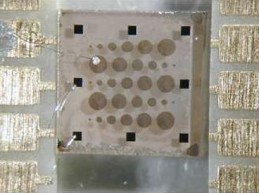Discovery could lead to faster computer clock speed
May 16, 2011

Lanthanum aluminate-strontium titanate composite, which looks like a slab of thick glass, with thin electrodes deposited on top of it (credit: the Ashoori Group)
A new physical phenomenon that could yield transistors with greatly enhanced capacitance and could lead to the revival of clock speed as the measure of a computer’s power has been reported by MIT researchers and their colleagues at the University of Augsburg in Germany.
Capacitance measures how much charge accumulates below the gate for a given voltage. The power that a chip consumes, and the heat it gives off, are roughly proportional to the square of the gate’s operating voltage. So lowering the voltage could drastically reduce the heat, creating new room to crank up the clock.
The researchers investigated an unusual physical system that results when lanthanum aluminate is grown on top of strontium titanate.
The researchers speculate that if the lanthanum aluminate gets thick enough, its electrical potential would increase to the point that some electrons would have to move from the top of the material to the bottom. The result is a conductive channel at the juncture with the strontium titanate — much like the one that forms when a transistor is switched on.
They then measured the capacitance between that channel and a gate electrode on top of the lanthanum aluminate.
They found that an infinitesimal change in voltage will cause a large amount of charge to enter the channel between the two materials. The researchers said that it’s not clear why the effect is so big and suggested that it could be a new quantum-mechanical effect or some unknown physics of the material. As a result, the textbook formula for capacitance may have to be rewritten, the researchers said.
The researchers also said that the phenomenon could eventually lead to the first increases in computers’ clock speed since 2002.
Ref: L. Li, C. Richter, S. Paetel, T. Kopp, J. Mannhart, R. C. Ashoori, Very Large Capacitance Enhancement in a Two-Dimensional Electron System, Science, 2011; 332 (6031): 825 DOI: 10.1126/science.1204168
